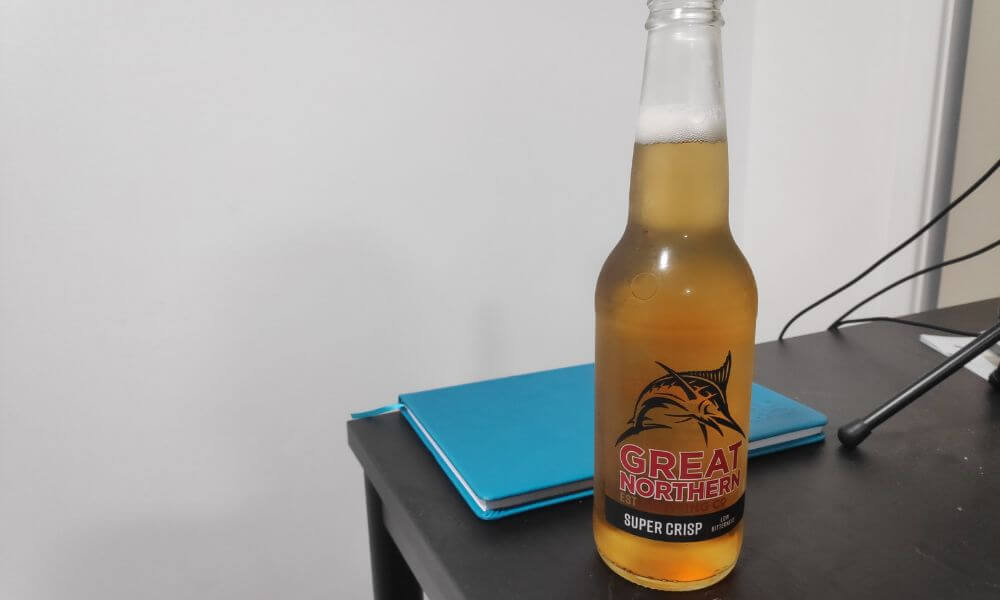If there’s one pastime that is beloved across times and cultures, it’s having a cold beer on a sunny afternoon or a Friday night.
Beer might be just about the oldest alcoholic beverage that humans have made, with evidence of beer production dating back tens of thousands of years.
In Australia, then, this has naturally led to a lot of different slang terms for beers. You might be wondering what some of these are and how to use them—so look no further.
Today, we’re going to look at some of the most common slang terms for beer in Australia.
Let’s get started.

Frothy/frothy one
On the international stage, this is likely one of the most well-known Australian slang terms for beer.
The meaning and connotation is pretty clear.
Beers are naturally frothy when poured into a glass, and thus you would go out for a “frothy one” of an evening after work.
Given how natural it is to call a beer a slang term like this, it can be very hard to know when and where it originated as the slang term it is today.
It’s not found in many written records, though we can probably say it entered widespread use came into being in the 20th Century as carbonated beers and tins became more widely available.
This is actually most often used in the plural, interestingly. “Get us a few frothies,” you might say.
Schooner
Interestingly, this one has a couple of meanings depending on the context.
Often, in Australian English, a “schooner” simply means a pint of beer.
“Let’s go get a schooner tomorrow night,” for instance.
But in more precise bar and beer terminology, a schooner is actually a serving of two-thirds of a pint, often used to serve craft beers.
However, these are not defined by UK law, where a schooner actually refers to a large sherry glass.
And in many Australian bars, schooner means a three quarters Imperial pint.
The word enters English in the 18th Century, perhaps from Dutch, and comes to mean “tall beer glass” by a least 1879.
How or when it entered Australian English is unclear, just as it is unclear when it came to be associated with beer at all.
Originally, it was a term to refer to a fore-and-aft rigged vessel.
Slab
This one, slab, specifically refers to a crate of beer that you would buy in a grocery store or supermarket.
However, it was specifically called a slab because of the flatter shape of the cartons which contained 9 litres of beer in stubbies—that is, 24 bottles.
Unlike the actual cube shaped crates, these were called slabs.
This change took place around the 1950s, and slab quickly became adopted as the slang term for these cartons.
Even today, you might call virtually any kind of crate of beer a slab.
But you won’t hear that anywhere else in the world.
Tallie
If there’s one thing Australians love in their slang, it’s adding a -y sound to the end of something to make it a slang term.
This is the origin of the term ‘tallie’. This one originated shortly after the widespread use of factory sealed bottles of beer in the late 19th and early 20th centuries.
They came to be called tallies to signify that they are tall bottles of beer, so again this is a specific term referring only to tall bottles of beer—again, as opposed to the stubbies that we mentioned earlier.
Today you’ll certainly still hear this term being used to refer to beer bottles. “Let’s go get a few tallies from the store,” for example.
You see a parallel with this in the US term ‘tallboy,’ which was actually a full-on brand name.
Tinnie
As I said, Australians love adding a -y sound on the end—but this one isn’t uniquely Australian!
Tinnie means a tin or can of beer, typically of any size.
Even though cans of beer are usually made of aluminum now rather than actual tin, the term has very much stuck around and is still widely used in Australia and the UK to a lesser extent.
Again, it’s quite difficult to trace the origin of a term that no doubt arose very naturally in colloquial speech.
Written records of the term don’t much predate 2005, as far as we can see, though the term is definitely a lot older than that.
In any case, if you’re looking for a good night in Australia, some tinnies are always a good plan!
Coldie/Cold One
It is an almost universal slang term for beer in some form or another—coldie, cold one, etc.
But it also speaks to an interesting fact about the way that most people tend to think of lager when they think of beer.
Lager is always served chilled, whereas you do get stouts and other ales that are not always served cold.

Lager is by far the most popular beer in Australia, and so coldie has become a catch-all term for beer.
The term likely originated in the 70s or the 80s when widespread lager commercials used to rely more heavily on the image of a cold beer as a selling point.
This is another of the most widely and commonly used, and uniquely Australian, slang terms for beer.
Grog
Given its discovery during the Age of Exploration, a lot of nautical and sailor slang made its way into Australian English over the course of its early discovery.
Grog is a very old sailing term referring to a drink of watered-down rum which would be given to sailors over the course of long voyages.
Eventually, it became more of a catch-all term for alcoholic drinks—cheap ones, that is!
So, it passed to Australian English from the earliest times that English explorers were visiting Australia and is still in use today.
It might seem a bit antiquated and is more of a humorous bit of slang than a serious or natural one, but it’s a uniquely Australian bit of slang, nonetheless.
Brewski
The term brewski is a great one to use and has been a really popular joke slang term for a long while.
It originates in American English and is a simple play on the stereotype of Russian words ending in -ski.
It quickly caught on in Australian English, too, and is still widely used today.
It most likely started being used in the middle of the 20th Century and gained popularity particularly during the Cold War.
Naturally, it also plays on the fact that beer is “brewed”, and thus a brewski.
In American slang, you might hear a beer simply called a brew.
This has other meanings in other English-speaking areas, meaning a cup of tea in parts of the UK.
This is a great one to use among friends.
Middy
It is also an interesting fact about beer slang that it tends to be based on measurements since before bottling and canning plants, the bar was the only place to get any beer—unless you brewed it yourself.
This is where our next slang term, middy, comes from.
It’s similar to the schooner measurement we mentioned earlier, middy meaning a 285 ml glass of beer.
So, really, this is something you’re only likely to use in a bar setting, but it is nonetheless uniquely Australian slang.
Skull
This one is more of a verb than a direct slang term for beer itself, but it’s interesting in any case.
Skull means to drink an entire beer in one gulp without taking a draft—for example, “I’m gonna skull this beer in one”.
Languages tend to have a slang term for downing drinks like this, but usually aren’t specific to a certain kind of beer.
Stubby
We mentioned the term “stubby” earlier in relation to another slang term, so let’s quickly look at this one on its own.
As I mentioned, a stubby is a particular kind of bottled beer that isn’t as big as a tallie.
Thus, they’re stubby and short.
This one is fairly self-explanatory and again, has its origins in the widespread adoption of bottling plants after the Industrial Revolution.
Bevvie
For a couple of reasons, “bevvie” has become a widely known Australian slang term for beer.
It’s certainly a really catchy one with clear meaning, and again one which has parallels in other English-speaking slang.
It is simply a shortening of and adding an -y sound affix to the word beverage.
Obviously, that word really means any drink, but with other similar slang like ‘bev’ it has come to colloquially mean an alcoholic drink.
Once more, it’s very hard to say for sure when it first started being used. It’s been popularized more in recent years, but it was in use from at least the 1970s in Australia.
So, if you’re looking for a quiet frothy one on a Friday afternoon in Australia, you’ve no shortage of ways to ask for it.
With such gorgeous weather over there, the impulse to have a cold one on a sunny day on the beach is all too irresistible.
Australians excel at slang and at having a cold beer at the right moment.
More in Australian Slang
- Australian Slang For Afternoon
- Australian Slang For Alcohol
- Australian Slang For Ambulance
- Australian Slang For Americans
- Australian Slang For Awesome
- Australian Slang For Barbecue
- Australian Slang For Beautiful
- Australian Slang For Beer
- Australian Slang For Boyfriend
- Australian Slang For Breakfast
- Australian Slang For Carpenter
- Australian Slang For Chocolate
- Australian Slang For Christmas
- Australian Slang For Cigarette
- Australian Slang For Clothes
- Australian Slang For Crocodile
- Australian Slang For Dad
- Australian Slang For Dinner
- Australian Slang For Dog
- Australian Slang For Drunk
- Australian Slang For Excited
- Australian Slang For Flip-Flops
- Australian Slang For Friend
- Australian Slang For Gas Station
- Australian Slang For Girl
- Australian Slang For Girlfriend
- Australian Slang For Goodbye
- Australian Slang For Hello
- Australian Slang For Kangaroo
- Australian Slang For Lazy
- Australian Slang For Liquor Store
- Australian Slang For Lucky
- Australian Slang For Man
- Australian Slang For Plumber
- Australian Slang For Police
- Australian Slang For Quilt
- Australian Slang For Redneck
- Australian Slang For Sandwich
- Australian Slang For Sausage
- Australian Slang For Swimsuit
- Australian Slang For Thank You
- Australian Slang For Toilet
- Australian Slang For Wine
- Australian Slang For Yes
- Australian Slang Quiz

